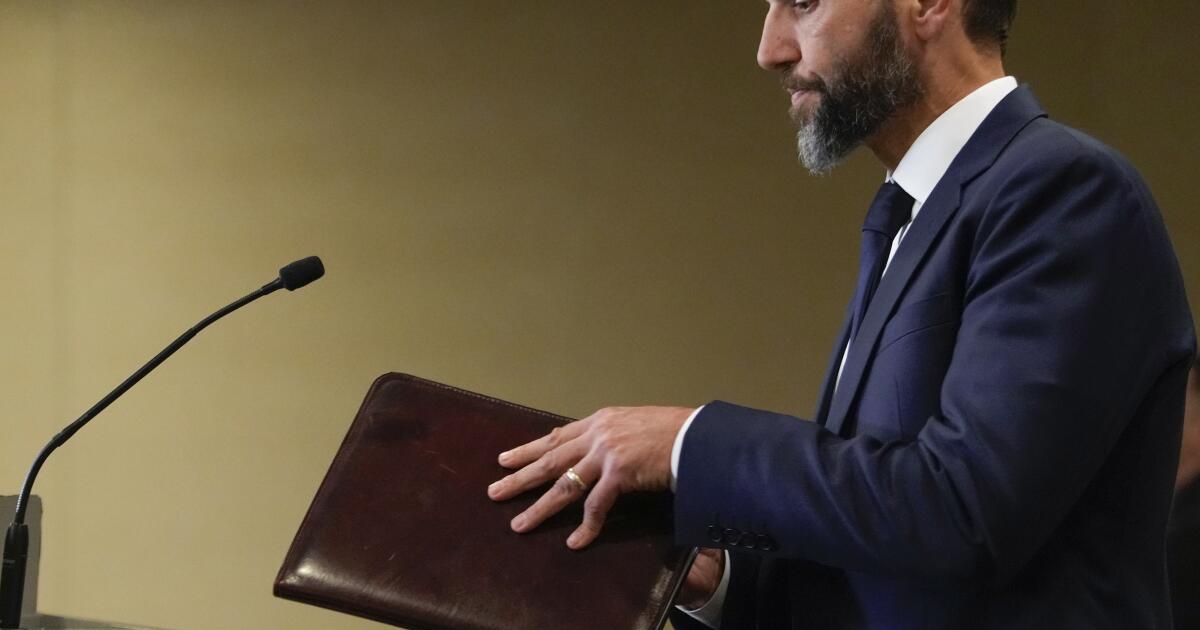In George Orwell’s classic depiction of an authoritarian society, “Nineteen Eighty-four,” a key component of political control is the state’s erasure of history: “Every record has been destroyed or falsified, every book has been rewritten … every date has been altered. … After the thing is done, no evidence ever remains.”
That is the state of affairs Donald Trump would like to produce with respect to the federal cases against him, which special counsel Jack Smith has developed in painstaking detail over the last two years.
Given Trump’s impending return to the White House, Smith now has two months to wrap up his cases. The primary question left for him and the Justice Department’s leadership is whether to produce a report of the Jan. 6 and classified documents cases and, if so, what it should look like.
The special counsel regulations that govern Smith require him to provide a confidential report to Atty. Gen. Merrick Garland explaining his decisions for or against prosecution. Garland has already made it clear that if he gets a report from Smith, he will exercise his discretion to make it public.
Given what Smith and other prosecutors have described as the “unprecedented circumstances” of the defendant’s election, the regulatory prescription is an imperfect fit. Smith obviously decided to bring charges against Trump in both cases and likely prepared a prosecution memo at the time explaining his thinking to Garland and others. But political events force him to close up shop in the midst of those prosecutions.
So what considerations should guide his and the department’s thinking about the preparation and content of a report?
First and foremost, the public interest dictates that we have the fullest possible historical account of what happened, which is a recognized justification for special counsel reports. Special counsel Robert S. Mueller III, for instance, declined to charge then-President Trump but provided a detailed and damning account of his findings that ultimately became public.
Smith has developed extensive evidence of truly grievous crimes, the worst ever allegedly committed by a president. The core of the Jan. 6 case is a breathtaking effort to exhort supporters to commit an insurrection and prevent the peaceful transfer of power, the sine qua non of a democracy. And the classified documents case presents probably the gravest violation of national security by a president, augmented by an extended and brazen campaign of obstruction of justice to impede the return of government property that Trump had no right to possess.
In my mind, the need for a detailed report on the latter is greater. The House Jan. 6 committee developed a detailed public record of the plot that culminated in the insurrection. Moreover, the Justice Department’s filings in the Jan. 6 case, especially its lengthy brief explaining the evidence it intended to present and why it was not foreclosed by the Supreme Court immunity decision, also left the public with a detailed account of Trump’s conduct.
No such public account exists in the documents case. That’s because U.S. District Judge Aileen Cannon has made a series of dubious rulings that have disrupted the department’s presentation. One of them, dismissing the case on the fringe theory that Smith was not properly appointed as special counsel, is pending before the U.S. 11th Circuit Court of Appeals.
The holes in the historical account are significant. What was Trump’s purported justification for spiriting the documents away to his Florida estate, Mar-a-Lago? How did he store them? Could they have been seen by foreign adversaries? Did he in fact show them to anyone, as the evidence that has become public suggests? And how did he and his co-defendants, Mar-a-Lago staff members Carlos De Oliveira and Walt Nauta, conspire to resist the government’s lawful demands to return the documents?
Trump and his circle are already adopting the stance that the election provided a decisive mandate for nullifying the prosecutions. We can be certain that when he takes the reins of government, he will have no compunction about destroying every last shred of information about them. In the style of Orwell’s Big Brother, he will likely try to scrub the pages of history of his misdeeds.
That would be a travesty and a rank disservice to the American people and history.
Trump’s argument for popular nullification doesn’t hold water in the first place. Far short of securing some decisive mandate, Trump appears to have received less than 50% of the vote, edging out Vice President Kamala Harris by one of the smallest popular-vote margins in history. Moreover, there is scant evidence that his winning coalition was moved by objections to the cases against him.
Not that it would matter if they were. History is not a plebiscite in which 50% of the current population decides what’s true and important. An accurate historical account is an independent value of a free society. That’s especially true in cases of heated disagreement about what happened. From that vantage point, it would be in the interest even of Trump and his co-defendants to have a full public record available.
One strong case for the importance of an accurate historical record of contentious, searing events was offered by the 9/11 Commission. The report it produced, as the commission noted, was essential for historical understanding, preventing the spread of misinformation, reforming national security and readiness, and maintaining public confidence in government.
All of these goals should be articles of faith in a democratic society. But it seems increasingly clear that this is not the sort of society Trump intends to foster. If he gets his way, history’s record of his crimes will be replaced by blank pages.
Harry Litman is the host of the “Talking Feds” podcast and the “Talking San Diego” speaker series. @harrylitman
Source: www.latimes.com


